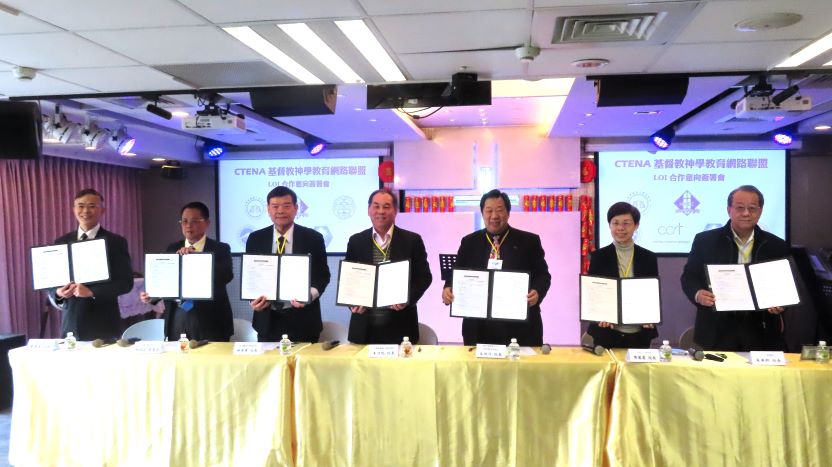Joint signing of the Letter of Intent for Cooperation. (Photo by Liang Jing-Yan)
Participants praying together. (Photo by Liang Jing-Yan)
The signing ceremony attracted the attention of many religious leaders, education experts, and media journalists. The seven seminaries participating in the signing were: Rev. Qiu Fang-He, President of the Chinese Online Seminary of New York Theological Education Center; Rev. Zhu Ben-Ye, President of Unity Theological Seminary; Rev. Wang Nai-Chun, President of Taiwan Nazarene Theological Seminary; Dean Chen Li-Xia of Hong Kong Christ Centered Theological Seminary; Dean Lin Rong-Dong of King’s Workplace Mission Seminary; Chairman Lin Mu-Cheng of Grace Mission Seminary; and Dean Tsao Ping-Yao of the International Bible Institute. Cheng Zhong-Xin, CEO of the Christian Tribune Foundation, served as the host.
Amidst the waves of globalization and digitalization, theological education faces unprecedented challenges and opportunities. Traditional seminary education models are limited by resources, geography, and faculty allocation, and the establishment of CTENA is a proactive response to this reality. The alliance is founded on the core principles of "co-creation, co-construction, sharing, and co-management," aiming to promote cross-seminary course resource sharing, enhance international academic accreditation standards, and drive innovation in theological education through information technology.
Dean Qiu Fang-He sharing.
During the signing ceremony, representatives from each seminary delivered speeches on their vision for collaboration, emphasizing the importance of unity and expressing confidence in future cooperation. As Dr. Cheng Zhong-Xin, President of the Christian Tribune and host of the signing ceremony, stated, “In this era of transformation, theological education must break away from isolated development models and unlock greater educational potential through networked collaboration.”
The signing of the "Letter of Intent for Cooperation" holds extraordinary symbolic significance. It not only lays the foundation for deeper collaboration among alliance members but also sets a new precedent for global theological education partnerships. Given the diverse faith needs of contemporary society, seminaries must adopt more flexible, open, and innovative cooperative models to continue exerting influence in the modern era.
Cheng Zhong-Xin, CEO, sharing.
Notably, the rapid advancement of artificial intelligence has also opened new possibilities for theological education. AI can not only assist in optimizing course content but also provide intelligent learning assistants to help students with personalized learning. Through big data analysis, theological education can better understand faith needs across different regions and cultural backgrounds, thereby offering more targeted teaching content. Additionally, AI can play a key role in theological research and biblical text analysis, helping scholars uncover deeper theological insights in conjunction with their own academic expertise.
Rev. Zhu Ben-Ye sharing.
Dean Wang Nai-Chun sharing.
Dean Chen Li-Xia sharing.
Dean Lin Rong-Dong sharing.
The establishment of CTENA is not only an adaptation to the development trends of theological education but also a forward-thinking initiative for the future. Through the alliance’s collaborative mechanism, combined with artificial intelligence and digital technology, theological education will transition from a single-institution model to a new era of resource sharing and cross-regional cooperation. This will inject new vitality into global faith education, expand the reach of gospel dissemination, and cultivate more faith leaders with a global perspective for modern society.
Acting Dean Liao Ming-Fa sharing.
Dean Tsao Ping-Yao.
Rev. Zhu Ben-Ye offering a blessing prayer.
 名人媒体生命网
名人媒体生命网
 The deans of seven interdenominational seminaries from around the world jointly signed the Letter of Intent for Cooperation, initiating the Christian Theological Education Network Alliance (CTENA). From left to right: Dean Tsao Ping-Yao, Chairman Lin Mu-Cheng, Dean Lin Rong-Dong, Dean Wang Nai-Chun, Dean Qiu Fang-He, Dean Chen Li-Xia, and Dean Zhu Ben-Ye. (Photo by Liang Jing-Yan)
The deans of seven interdenominational seminaries from around the world jointly signed the Letter of Intent for Cooperation, initiating the Christian Theological Education Network Alliance (CTENA). From left to right: Dean Tsao Ping-Yao, Chairman Lin Mu-Cheng, Dean Lin Rong-Dong, Dean Wang Nai-Chun, Dean Qiu Fang-He, Dean Chen Li-Xia, and Dean Zhu Ben-Ye. (Photo by Liang Jing-Yan)